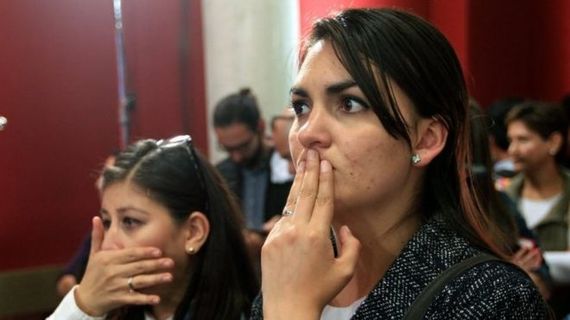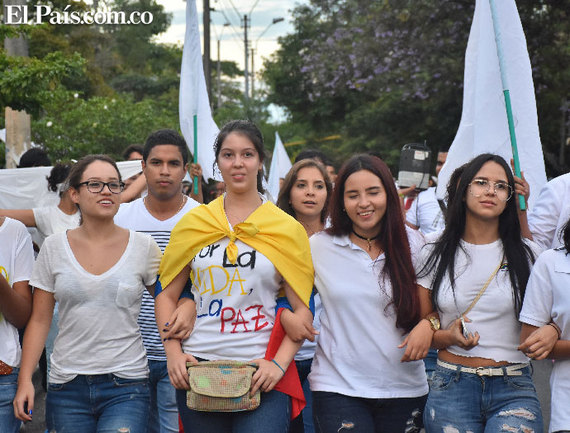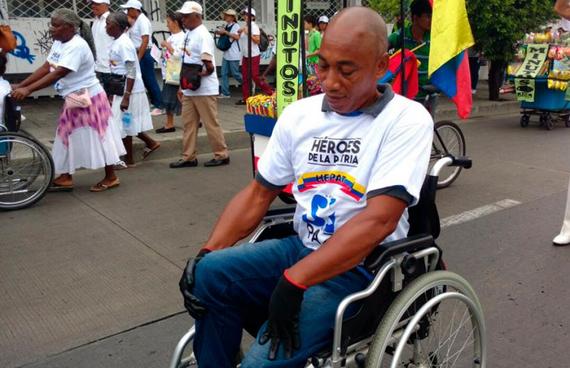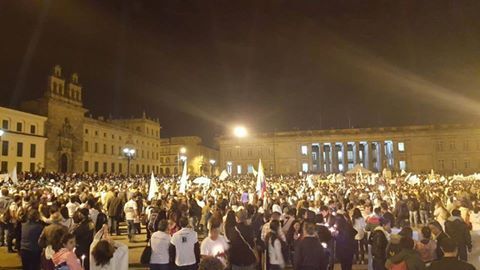By Alex Sierra and Ted Lewis
On Sunday, October 2, Colombians voted in a national referendum to ratify a peace accord signed government of President Juan Manuel Santos and the rebel FARC, an agreement that had been hammered out during four years of negotiations in Havana, Cuba.
But in a decision that defied the expectation of polls and pundits, the NO vote squeaked to victory, taking 50.21 percent of the approximately 13 millions votes cast.
Low voter turn out -- only 37 percent of registered voters participated -- was a major factor. Some of that can be attributed to torrential rains associated with Hurricane Matthew, but the results made it abundantly clear that, justified or not, Colombians have serious reservations about this peace accord.
What was at stake in the referendum?
The Santos government and the FARC had reached an historic agreement in six main areas:
•End of armed conflict, a bilateral ceasefire, and the final laying down of arms. These things, in fact, have already happened as part of the confidence building over the last three years. During those three years Colombia has maintained its lowest homicide rate in nearly two decades.
•A comprehensive agrarian reform that involves the restitution of land to peasants who were usurped by different actors in the conflict (including powerful ranchers and farmers who have used paramilitaries to displace and kill thousands of people).
•Political participation that grants 10 seats (5) in the Senate and (5) in the House of Representatives to members of the FARC. This concession does not change the legislature, nor would it have given the former guerrillas the power to initiate legislation, much less promote profound changes to the Colombian political system.
•A change in the focus of narcotics policy (the drug war) to emphasize crop substitution, prevention programs, and public health campaigns as the lead strategies to cut supply, demand, and use of illicit drugs.
•The establishment of a special judicial branch to serve a "truth and justice" mandate - focusing on supporting victims and establishing truth about crimes committed against them.
• Ratification of the Accords via plebiscite
Colombia did not vote for more war.
The media often framed the referendum as a choice between peace or ongoing war in Colombia, but Colombians were, in truth, voting on a peace agreement that had been worked out behind the scenes in Havana. For years, the details of negotiations were kept hidden from the public with the goal of minimizing interference by the media and other outside influences.
The negative results make clear that advocates of the peace accord failed to communicate the fundamentals of the agreement in everyday, language, broadly accessible to poor and undereducated Colombians. Such voters were especially vulnerable to the manipulations of the ultra-right who used fear and distortion (Fox news style) to sway the vote.
The right spread false claims that the agreement would turn the country over to "Castro-Chavez communism" and "atheism," while forcing farmers to turn their land over to the FARC. None of this is true, but these types of counter factual arguments often went unanswered, and swayed votes.
The land reforms in the peace accord did pose risks to powerful interests who illegally obtained land via paramilitarism. This created a strong motive for powerful and wealthy actors to oppose and lie about the peace accord.
Meanwhile, many Colombians feel they have little to gain no matter the outcome and simply stayed home.
Polarization inherited from the war
The electoral forces at work in the recent referendum are reminiscent of those at work in 2014 when President Santos sought reelection and was challenged by a candidate backed by Alvaro Uribe, the still powerful and far-right, ex-president.
Santos won that time, but the battle over whose vision for Colombia would prevail wasn't settled and it became deeply personal. Voters were turned-off and abstention rates rose to historic highs.
The echoes of 2014 may have helped doom the peace referendum. Sadly, many Colombians evaluated the accords less on their merits and more through the polarizing lenses of old personal antagonisms.
The FARC faces widespread repudiation by a public that rejects their history of kidnapping, armed takeovers of towns, extortion, and the planting landmines that have killed or injured 11,000 people over the last 25 years. Nevertheless, it must be noted that paramilitaries carried out similar types of atrocities and are responsible for far more killing and massacres than any of the guerilla armies.
It is also important to note that in the parts of Colombia that have suffered the largest number of war victims -- including places that have registered the most attacks from the FARC -- the YES vote won overwhelmingly.
Compare that to central regions of the country, far less affected by recent war and combat where NO vote partisans fanned partisan resentments and hatreds that have brewed for decades.
There is widespread popular rejection of all the armed actors in Colombia, but ironically, anxieties heightened by the long armed conflict have made many Colombians wary of changes they fear might make them poorer or more vulnerable, somehow taking what little security they have.
Possible way forward after the NO Vote
Rejection of the peace accords cannot, by any means, be read as an endorsement of continuing a war that has left 300,000 Colombians dead or missing and driven 7 million more out of their homes and off their lands during the last half century.
The finally tally in the referendum ended an atmosphere of triumphalism that had prevailed among YES advocates who were convinced they would win based on the same polls and punditry that had convinced news outlets around the world that a YES vote was coming.
Now, despite the unsettling outcome, the FARC have said they will remain on the path toward reconciliation and negotiators have reconvened in Havana. But the Santos government has reversed course and put an October 31 limit on the cease-fire that had been considered final. At least for the moment no one seems eager to return to the battlefield, but the current calm is tenuous.
This uncertain crossroads presents an unprecedented challenge to Colombian (and international) civil society to find strategies to connect with, inform, and engage citizens who have shown little interest in or faith in the peace process. Colombia's NGOs and traditional social leaderships need to rise to the occasion, overcome barriers to unity, and find new language and ways to engage the many challenges of building peace.
No matter what happens in negotiations or future referenda, it is a top priority for civil society to reach out to, support, and open doors for those who have suffered and survived the war to have their voice heard and to become leaders in their communities and of their own destinies.
International support and accompaniment can play a vital role in jump-starting this stalled reconciliation process. Organizations such as the Association of Relatives of the Detained and Missing - ASFADDES, whose members have spent up to 30 years feeling the pain of not knowing the fate of their loved ones are clear that, "international support is vitally important for the country right now."
They have joined a broad plea to friends of Colombia around the world: "We welcome all the voices that will help us promote peace and put a definitive end to the needless political violence that has claimed so many lives."
The images of Colombians coming together and seeking peace after decades of war resonated beyond Colombia to Central America, Mexico, and other regions beset by (drug war) violence. On Wednesday, just three days after the failed referendum, hundreds of thousands of Colombians followed students into streets of Bogota and thirteen other Colombian cities calling for the peace accord to go into effect. Social media lit up all over the region.
Peace is not simple and setbacks are inevitable. But a new generation of Colombians has an enormous stake in making peace prevail. And so does the international community as last night's announcement of the Nobel Peace Prize being awarded to President Santos so clearly demonstrates.
Alex Sierra, co-author of this article, is a Colombian human rights defender and researcher who works with CESJUL - the Center for Latin American Social and Legal Studies.





